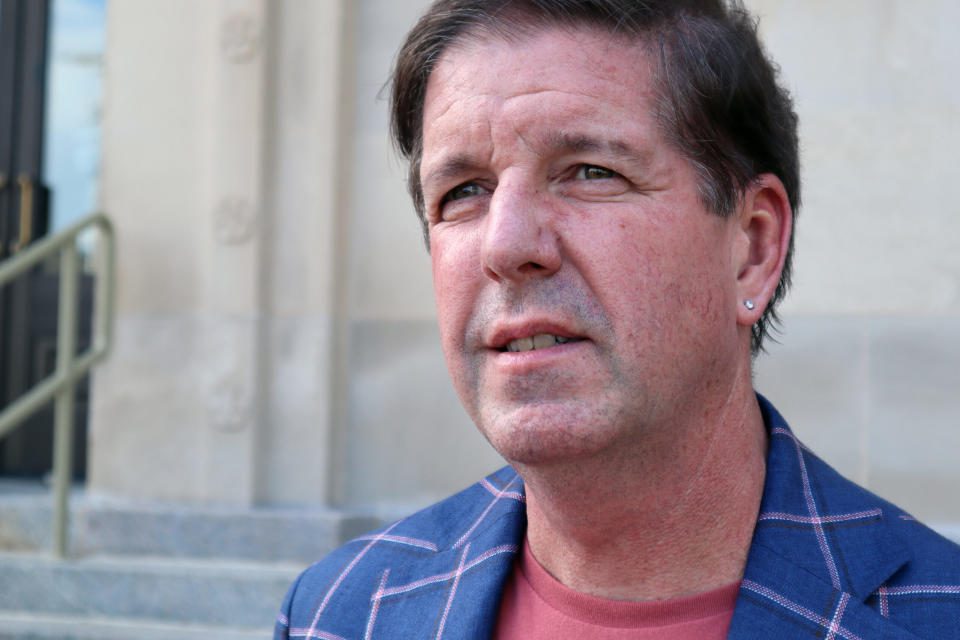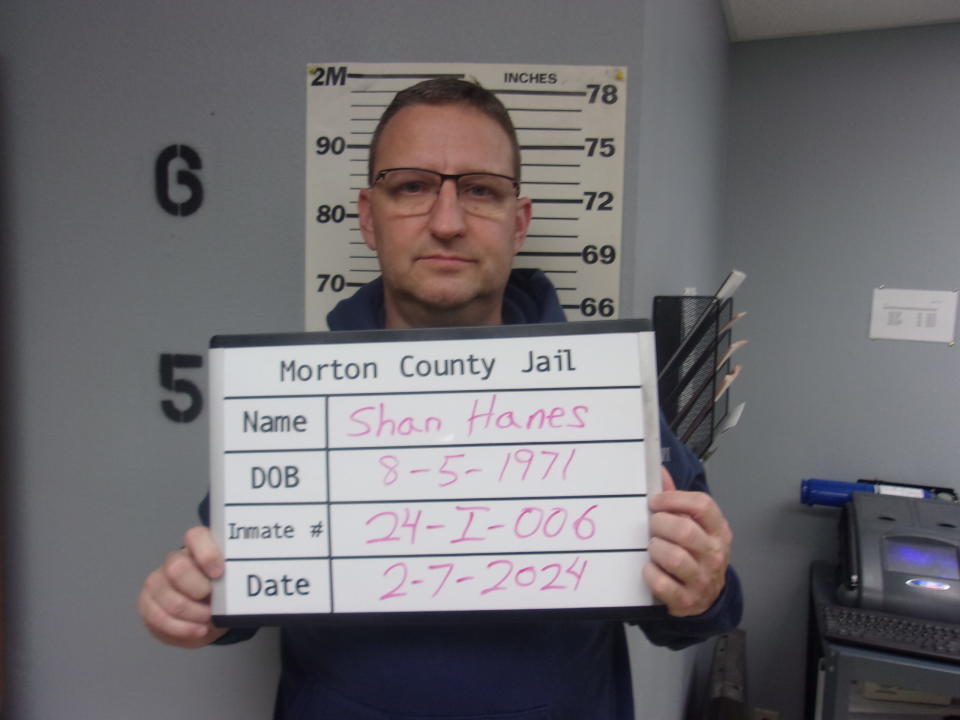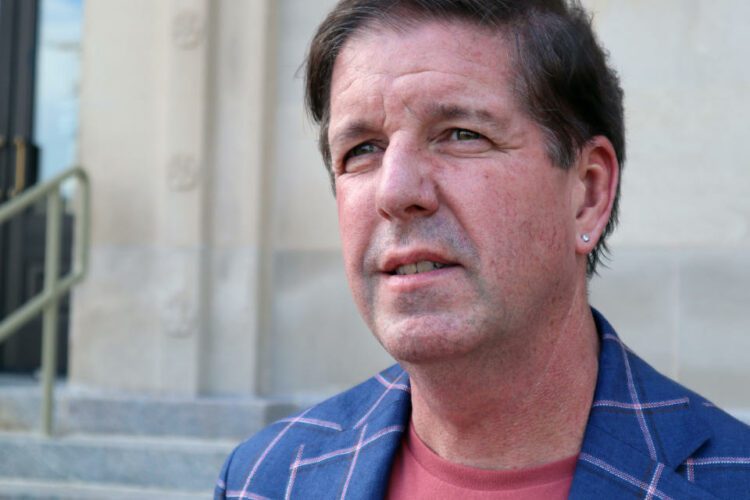U.S. Attorney Kate Brubacher answers questions at a press conference on the steps of the federal courthouse Aug. 19, 2024, at Wichita following the sentencing of former Elkhart banker Shan Hanes. Brubacher, who said the 24-year sentence was a “measure of justice” for the victims, was joined by FBI special agent in charge Stephen Cyrus (left) and Cory Nootnagel, a Federal Reserve assistant special agent. (Max McCoy/Kansas Reflector)
WICHITA — The judge rocks gently in his chair behind his marble bench on the second floor of the federal courthouse. He listens as the victims of an embezzlement scheme that took down the Heartland Tri-State Bank in far southwest Kansas are called to stand before him to tell their stories of loss and broken trust.
A yellow bow tie peeks from the collar of the judge’s robe.
It’s Monday, Aug. 19, and I’m sitting in the second row of benches in the gallery, waiting for the judge to pass sentence in the cryptocurrency fraud case that has drawn international attention since news of it broke last summer. There has been a plea deal and because this was a white collar crime — embezzlement by a bank officer — I expect a comparatively light sentence. I’m also hoping more details of the byzantine fraud scheme will emerge during the hearing.
The judge, John Wesley Broomes, stops rocking when a victim says something of particular interest. Economic harm has been done that will take generations to heal, some say. Others talk of retirements stolen, the burden of having to care for aging parents, an institution burned to the ground. A few will talk about how their faith, in both community and God, has been tested.
“I’ve tried to reconcile this in my head,” says Brian Mitchell, an Elkhart resident and business owner. “The damage that has been done to my town I can only describe in two words: pure evil.”
While the victims have been instructed to address their statements to the court — that is, to the judge on his bench, with the words UNITED STATES OF AMERICA above him like a banner unfurled — they are inescapably telling their stories to the man who is responsible for their pain. Defendant Shan Hanes sits just a few yards to their right, at a table with his defense attorney, defeated and yet somehow defiant.
Hanes wears a yellow tie and blue shirt with a somewhat rumpled suit of a hard-to-define color that is a relative of brown. His hair appears recently cut but he has a bit of chin stubble, and his face is pallid. He takes notes, left-handed, on a legal pad and when he glances over at the victims, he purses his lips.
“Thirty years of working in adjacent offices did not prepare me for the level of deceit,” recounts Moe Houtz, a bank officer, in a prepared statement read by Mitchell. Houtz is in the hospital back home. Houtz’s wife, Marla, stands nearby.


Brian Mitchell outside the federal courthouse
The victims fill the left third of the gallery, on the side of the courtroom behind the prosecutor. They were shareholders in the bank, individuals whose investments ranged from the modest to the substantial, but whose assets in the failed institution are now exactly the same amount of dollars — zero.
It is the closest any of the victims have been to Hanes since the bank failure of July 28, 2023. That’s when the state banking commissioner declared the Heartland Tri-State Bank of Elkhart insolvent, the FDIC assumed control, and the bank sold to a competitor.
In an eight-week period ending July 7 of last year, Hanes — the Heartland CEO — embezzled $47 million to cover his losses in a complicated cryptocurrency scheme. He did this in a series of 10 wire transfers, according to court documents, each transfer ranging in the millions, to Payward Ventures, a largely unregulated crypto exchange better known as Kraken.
The case may be the most notorious example of white collar crime in Kansas history, bigger even than the Great Kansas Bond Scandal of 1933. In that scheme, more than $1 million in municipal bonds were forged.
By the time the Heartland bank failed, Hanes had already burned through his youngest daughter’s college fund and stolen $10,000 from his friends in a local investment club and $40,000 from his church where he sometimes preached the love of Jesus. The numbers are clear enough, but the reasons why Hanes broke bad and stole so much so fast may never be fully understood. The easy answer is greed, but ever since news of the bank failure broke last year, there have been few details about exactly who Hanes thought was on the other side of his cellphone.
Regulators said it was the kind of scam known as “pig butchering.”
Typically run by organized criminal gangs in southeast Asia, the scammers use modern technology to run one of the world’s oldest grifts — the lure of easy money. While the FDIC protected the bank’s depositors, it did not cover the $13 million lost by the shareholders or the retirement accounts of its employees.
“My creator says I have to forgive,” says Marla Harris, a Heartland investor. “I’m not ready to forgive you, Shan, but I have to. You put me in the place of having to deal with my God for something I didn’t do.”
Elkhart is in the extreme southwestern corner of Kansas, just above the Oklahoma panhandle, and 270 miles away from the Wichita courtroom. The main street in Elkhart still resembles that of the famous Dust Bowl photographs taken in the 1930s. It’s a town of just under 2,000, and people’s lives are entwined in ways common to rural communities. The victim statements are elliptical in that most reference the defendant and others as friends, neighbors, co-workers. Their parents knew each other’s parents. Their children played together.
Everyone knew Hanes, whose first name is pronounced “Shane,” formerly regarded as smart and influential and honest, the kind of guy who personally cut the grass at Heartland bank. It was the sort of thing that endeared him to the community, although now it seems that it might all have been part of a carefully calculated act. That disconnect from who Elkhart thought Hanes was to the criminal he turned out to be runs through the victim’s stories like a refrain.
“I’d just like to know why (Shan) would do this,” says Dan Smith, a former vice president of Heartland Bank, a director and an associate of Hanes for 30 years. “For whatever reason, you burned it to the ground.”
There is no question of guilt before the court.
Hanes already entered a guilty plea, on May 23, to a single count of embezzlement by a bank officer, an offense punishable by up to 30 years in prison. In exchange, federal prosecutors agreed to file no additional charges and allow Hanes to request a lighter sentence. He did this, through his attorney, requesting a “downward variance” from the advisory sentencing guidelines, based on the severity of the crime and other factors, that call for him to serve at least 235 months.
“I signed off on eight of the 10 wire transfers in the case” because Hanes lied to her, says Mandy Burton, the former Heartland CFO. She and her husband, who were investors, took a large financial loss. “I was left to deal with regulators and investigators. … I worked 21 days straight.”
Hanes had no prior criminal record, accepted responsibility and did not ultimately profit from the embezzlement, his attorney, John E. Stang, argued in a sentencing memorandum. In addition, Hanes faces another seven years in prison if convicted of state charges filed in the case. That might make him 76 upon his release.
“All he can do at this point is try to pay back the restitution upon his release from prison,” Stang wrote. A shorter sentence would make it more likely that Hanes could find employment to pay back at least some of the restitution, he argued.
The prosecutor, assistant U.S. attorney Aaron L. Smith, answered that substantial restitution was likely not an option.
“Full recompense appears nearly impossible no matter what age the defendant has available in his working years,” Smith wrote. “Further, with the large number of victims and staggering loss, any restitution would be spread quite thin.”
Smith asked for a sentence of 264 months — 22 years — as “just and appropriate.”


Heartland Tri-State Bank of Elkhart was taken over by Dream First Bank
“News crews and journalists have cast a negative light” on the community, says Jim Tucker, a county commissioner who said Hanes lied about the bank having a $100 million bond when actually it was only $2 million. Tucker’s family held 8,602 shares of Heartland, once worth about $1.4 million. “My family’s dreams have been wiped out.”
The sentencing hearing in Judge Broomes’ court has a somewhat surreal quality, perhaps because the restored 1930s decor looks as if it came from a movie made from a John Grisham novel. The courthouse was opened in the depths of the Great Depression, as the U.S. Post Office and Courthouse. “The interior is lavishly finished with marble, walnut, and gold leaf,” notes the WPA Guide to 1930s Kansas.
The six-story building, 401 N. Market, displays a “skillful blending of Art Deco and classical influences,” according to the General Services Administration website. The building was used as the city’s central post office until 1984 and then restored by the GSA to its original appearance. A pair of Depression-era murals have been retained on the first-floor lobby.
But the art and architecture aren’t entirely responsible for the odd feel.
We have perhaps become accustomed to having our reality mediated by technology — and, at least for those who sit in the gallery, technology is disallowed. There are no cellphones or cameras here, no electronic devices of any kind not under control of the court. We lean forward, straining to hear, wishing the sound system wasn’t so raspy and that people on the other side of the bar would speak directly into the microphones. If you want notes, you take them the old-fashioned way, with pen and paper. A New York Times reporter sits in the front row, doing just that.
Then there is the emotional weight the victims bring with them into the courtroom, almost as if they carry bags stuffed with pain. Court cases, especially criminal ones, are frequently filled with emotional and physical trauma, but it is unusual for an entire community to be hit so hard.
“There’s no reward that would have been worth the risk you took,” investor Patrick Overpeck tells Hanes directly, comparing the embezzlement to driving a bus of family and friends off a cliff. “The only thing we’re guilty of is that we trusted that man too much.”
“The burden of trust,” Smith says at the sentencing hearing, includes responsibility, loyalty, and humility. “Greed and arrogance do not know these burdens.”
After the victims have made their statements, the judge addresses the audience.
“Does anybody want to speak for this man?”
None volunteer.
Then it is Hanes’ turn to speak for himself.
“I had no intention of ever causing the harm that I did,” he says in a weak voice. He acknowledges that his family — his wife and three grown daughters — will deal with his actions for the rest of their lives. “To the shareholders, they were my friends and family, too.”
He glances over his shoulder at the victims and tosses out: “Sorry.”
He then rambles, saying he wishes others could understand his intent.
“So far, I haven’t heard anything to help me understand,” the judge says.
Hanes talks about wanting to get the money back, says he was “working with” somebody he thought he could trust, but things “got out of hand.” He said he made decisions he thought were good at the time. But Hanes adds nothing to the judge’s understanding, or ours, of what was going through his head — and through his phone — during the eight-week embezzlement spree.


Banker Shan Hayes
“OK,” Broomes says.
Then the judge turns to the victims.
“This is one of the most difficult cases I’ve had to deal with except child pornography in terms of victim impact,” he says. “My suggestion to you is to try to forgive this man. If you set him free, you set yourselves free.” It’s tough advice, the judge says. “I know these are not easy things to put behind you. But he’s already taken enough from you.”
Then the judge addresses Hanes.
“Your conduct has injured your community in a way that’s not easily captured with words,” Broomes says. We live in an age where people don’t put much stock in truth, and there’s a general lack of concern for others. But “out here on the southern plains there’s still a sense that community means something, a man’s word is his bond.”
The case represents a betrayal of trust that cannot be reconciled with sentencing guidelines, Broomes says. We live in a free republic where we rely on a justice system pursuant to the rule of law.
“Human beings,” the judge says, “by their very nature need to see that justice is done.” Broomes speaks slowly and deliberately, searching perhaps for the right words to convey an idea approaching the ineffable in a sacred civic space. In other systems, he says, justice is in the hands of a powerful few but here all people stand equal before the law. Then he returns to a thought: “People need to leave here feeling that justice is done.” He cites the danger of individuals feeling the need to “augment” punishment, but stops short of saying vigilantism.
Then he addresses Hanes directly.
“You knew better. You were not a fool.”
As a bank officer Hanes was well informed about fraud. He’d had many opportunities to stop his criminal behavior. A sentence is required that will deter future conduct. There is no basis for a downward variance.
Broomes hands down a sentence of 293 months.
That’s more than 24 years. It is the maximum prison time under the advisory guidelines. It’s also more than the prosecution had asked for. Some of the victims gasp, others put hands to their mouths.
Hanes stares at the judge, a pen clutched in his left hand.
The judge orders Hanes immediately remanded to custody.
Hanes is directed to empty his pockets. He hands over his tie, his watch, his belt. He is shedding the artifacts of his former life. Then his hands are cuffed behind him and he’s led out of the courtroom. He will be taken to the Butler County Jail, 30 miles away, to await transfer to a federal prison.
On the other side of the gallery, a small group of Hanes’ family members begin to cry. Is his wife among them? I don’t know and decide not to ask. It’s difficult not to feel sorry for them.
Nobody on the victim’s side of the gallery says anything. There is no cheering, no clapping, no taunts.
“It would have been very easy at the end of that for us to clap and say, ‘Rot in hell,’ ” Mitchell tells me later. “But it wasn’t a celebratory moment. It was weird. You still have a hole in your stomach. There’s just no way to get a complete resolution.”
Max McCoy is an award-winning author and journalist. Through its opinion section, the Kansas Reflector works to amplify the voices of people who are affected by public policies or excluded from public debate. Find information, including how to submit your own commentary, here.
Source link : http://www.bing.com/news/apiclick.aspx?ref=FexRss&aid=&tid=66cb1debd6184d7c97c5640bef3162eb&url=https%3A%2F%2Fwww.yahoo.com%2Fnews%2Fkansas-courtroom-victims-cryptic-bank-083317237.html&c=13517678832314735364&mkt=en-us
Author :
Publish date : 2024-08-24 21:33:00
Copyright for syndicated content belongs to the linked Source.
